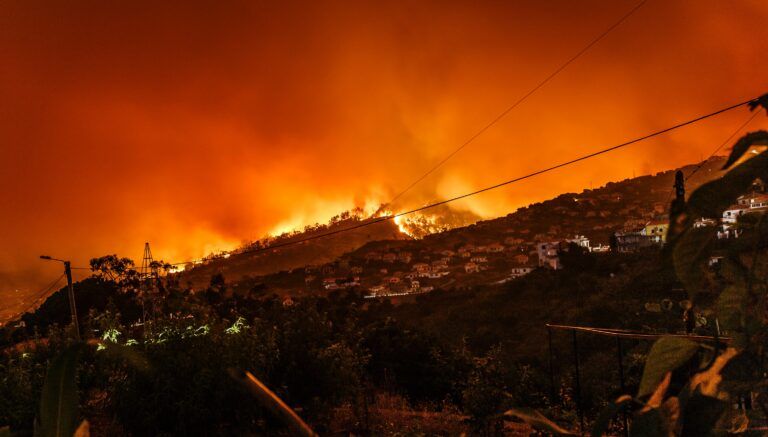Originally published on September 25, 2023 in Climate Home News
Increasingly strong heatwaves and the wildfires that swept through Portugal in 2017, fueled by climate change, have had a devastating impact on many of those living in the country, particularly its youth.
Yet the 33 countries in the Council of Europe, many of whom are among those most responsible for historic greenhouse gas emissions, fall far short of the drastic measures needed to keep the world from burning.
Six youths from Portugal are challenging that collective failure, in a case that will be heard on 27 September in the European Court of Human Rights (ECtHR).
Claudia, Martim and Marian Duarte Agostinho, and Catarina dos Santos Mota are from the district of Leiria, in central Portugal, which was swept by devastating wildfires in 2017. The fires came near their homes and left the garden of the Duarte Agostinho family home covered in ash.
Martim was unable to go to school for several days due to the smoke, and all four of them were horrified to know that people died in the fires close to their homes. They and the other two applicants, Sofia and André dos Santos Oliveira from Lisbon, suffer from anxiety about the effects climate change will have on them, on their families, and on any families they may have in the future. The increased heat due to climate change has led some of them to experience trouble sleeping and reduced energy levels, and has limited their ability to spend time or exercise outdoors.
In the hearing on 27 September, the 17-member Grand Chamber of the ECtHR will be asked to decide whether the abject failure of the members of the Council of Europe to adequately curb emissions violates the youths’ rights to health, privacy and a healthy environment under the European Convention on Human Rights.
The Council of Europe Human Rights Commissioner, the UN Special Rapporteur on human rights and the environment, and the UN Special Rapporteur on toxics and the environment are among those who have intervened in support of aspects of the youths’ claims.
While the six young people reside in Portugal, that fact should not prevent the court from finding the other 32 countries responsible for the harms they have suffered. As the Council of Europe’s Commissioner for Human Rights put it in her intervention in the case: “Given the global, cross-border nature of climate change, state parties cannot allow emission of greenhouse gases to continue without regard for the consequences that this has for the rights of inhabitants of other member states.” The impact of emissions is not, and cannot be, limited to the emitting country, and emitters must be held accountable for the resulting harms.
A favourable decision in this case would be a pivotal step in the recognition of the human rights obligations of countries in relation to climate change, in particular the responsibility of governments to protect people against the foreseeable impacts of a failure to curb emissions, including impacts that occur outside of their own territory. It would also likely encourage similar challenges in other regional and national courts.
The scientific facts are clear: governments from major CO2 emitting states are failing to meet their obligations to halt global warming, with devastating consequences for our planet, and for the human rights of present and future generations. The Duarte Agostinho case presents a critical opportunity to hold 33 of them to account.
Photo Credit: Wildfire in Portugal. Photo by Michael Held via Unsplash (CC0 1.0).







